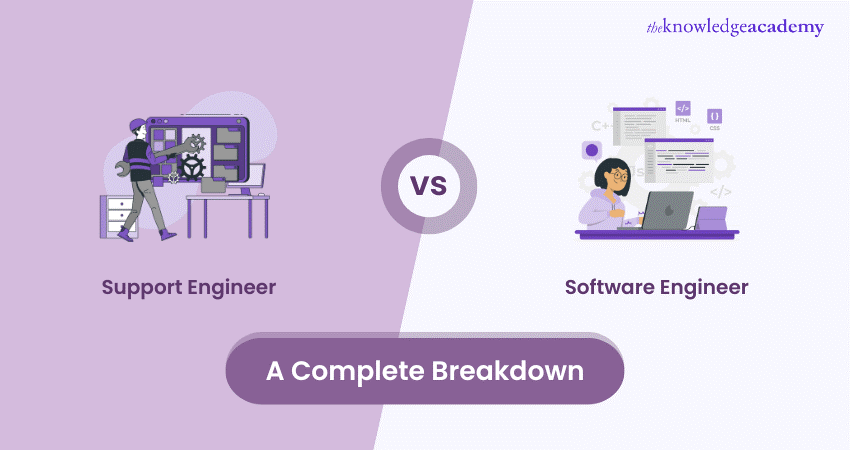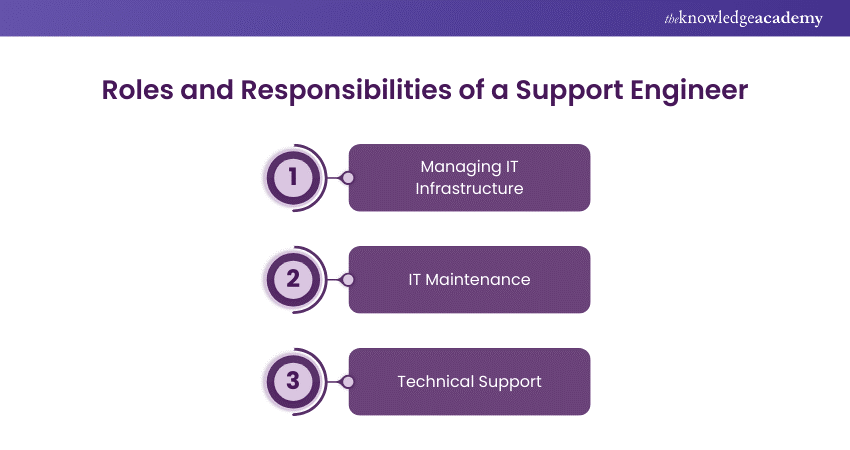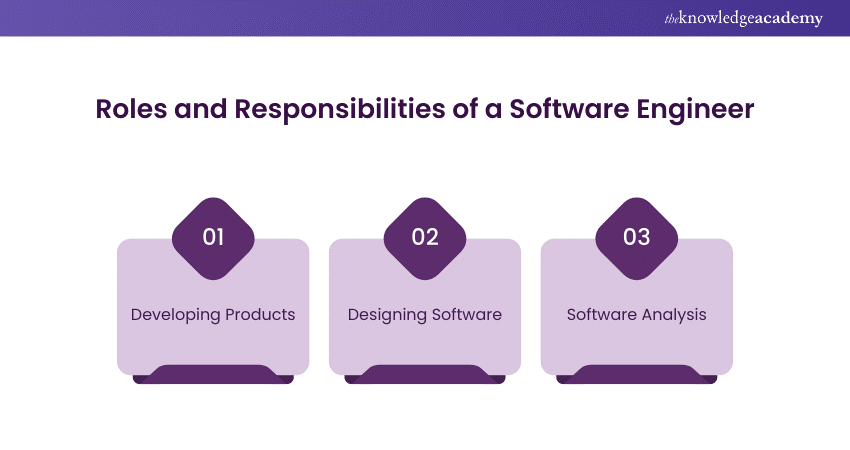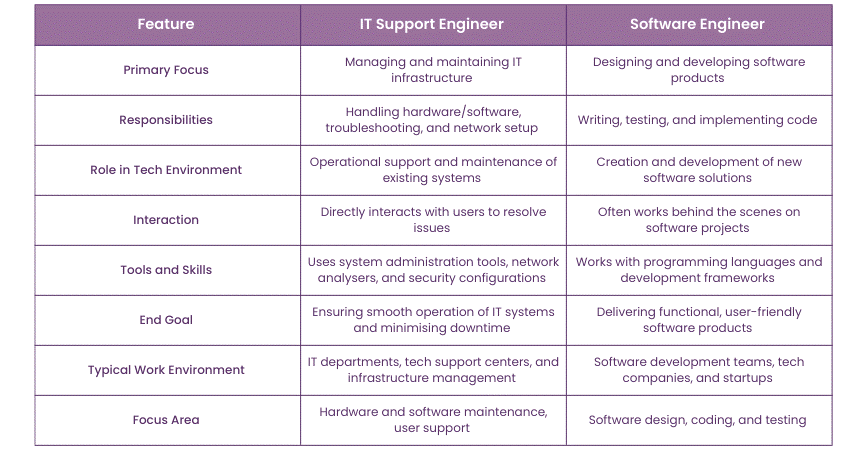We may not have the course you’re looking for. If you enquire or give us a call on 01344203999 and speak to our training experts, we may still be able to help with your training requirements.
Training Outcomes Within Your Budget!
We ensure quality, budget-alignment, and timely delivery by our expert instructors.

In the fast-paced tech industry, job roles can easily blend together, causing disarray between the responsibilities of support engineers and software engineers. This confusion often leads to misaligned expectations and team inefficiencies, eventually hindering the business productivity. Understanding these roles is crucial not only for smoother operations but also for unlocking their full potential. In this blog, you'll explore the battle of IT Support vs. Software Engineer and uncover how these elemental functions collaborate to improve the tech ecosystem.
Table of Contents
1) Support Engineers- an Overview
2) Education and Career Path for Support Engineers
3) Roles and Responsibilities of a Support Engineer
4) Traits of IT Support Engineer
5) Software Engineers - an Overview
6) Education and Career Path for Software Engineers
7) Roles and Responsibilities of a Software Engineer
8) Traits of Software Engineers
9) Support Engineer vs Software Engineer: Major Differences
10) Conclusion
Support Engineers- an Overview
Support engineers are essential IT professionals who manage and maintain IT infrastructure, working with both hardware and software. They set up networks, troubleshoot technical issues, and ensure smooth IT operations. Unlike software engineers, who focus on software development, support engineers keep systems running and users satisfied with their tech experience.
Education and Career Path for Support Engineers
Aspiring support engineers typically pursue a bachelor's degree in computer science, information technology, or a related field like electrical engineering. This education equips them with the technical skills to manage IT infrastructure, troubleshoot issues, and work effectively with both hardware and software. Support engineers can find career opportunities in IT companies, tech-specific call centres, or as in-house IT specialists across various industries, with a key focus on maintaining smooth IT operations.
Roles and Responsibilities of a Support Engineer
Support engineers play a critical role in ensuring the smooth operation of IT systems within an organisation. Their responsibilities are multifaceted and cover various aspects of IT infrastructure, maintenance, and support.

1) Managing IT Infrastructure
Support engineers are responsible for setting up and maintaining the organisation's IT infrastructure. This includes installing and configuring hardware, software, and networks to ensure efficient and reliable performance. Additionally, they also handle network security, data backups, and disaster recovery plans, ensuring the IT environment remains robust and secure.
2) IT Maintenance
Support engineers are key in maintaining IT systems regularly. They monitor systems to prevent issues, apply updates and patches, and ensure all hardware and software components function optimally. Their proactive approach also helps minimise downtime and keeps the organisation's technology running smoothly.
3) Technical Support
Support engineers provide frontline technical support to resolve issues in the IT environment. They troubleshoot and fix problems related to hardware, software, and networks, often working directly with end-users to address their concerns. This role is crucial in ensuring employees can work efficiently without technical disruptions.
Become a hardware expert. Register for our Computer Hardware Troubleshooting Course today!
Traits of IT Support Engineer
Support engineers excel at problem-solving and troubleshooting. They thoroughly understand hardware and software systems, pay attention to detail, and quickly diagnose and resolve technical issues.
Additionally, they frequently interact with users, providing support and explaining technical concepts clearly, demonstrating strong communication skills. Their adaptability and proactive approach enable them to manage and maintain IT infrastructure effectively, ensuring systems run smoothly and minimising downtime.
Software Engineers - an Overview
Software engineers are key IT professionals who focus on designing, developing, and maintaining software systems. They work primarily with code to create applications, operating systems (OS), and other software solutions that meet user needs.
Unlike support engineers, who manage IT infrastructure, software engineers concentrate on writing, testing, and improving software. Their work is essential in building the digital tools and platforms that power businesses. Additionally, they ensure that software is efficient, secure, and user-friendly, which in turn contributes to tech ecosystem productivity and innovation.
Education and Career Path for Software Engineers
Aspiring software engineers typically pursue a bachelor's degree in software engineering, computer science, or a related IT discipline. This academic qualification equips them with the required coding, algorithms, and software design skills. With these skills, they can build and maintain a wide range of applications and IT systems.
The career paths of software engineers often lead to roles in tech companies, startups, or large organisations where they focus on developing innovative software solutions. Their work is central to advancing technology and creating efficient, user-friendly software products.
Roles and Responsibilities of a Software Engineer
Software engineers play a vital role in creating and maintaining digital products. Their diverse responsibilities cover various aspects of software development, design, and analysis.

Developing Products
Software engineers are responsible for writing, testing, and implementing code to build software products. They work on the entire IT range, from mobile apps to complex operating systems, ensuring the software meets user needs and functions seamlessly. The software engineer's work is crucial in turning ideas into practical, user-friendly digital solutions.
Designing Software
In designing software, engineers plan and structure the architecture of applications and systems. They determine how different components will interact, select appropriate technologies, and ensure scalability and security. This stage involves collaboration with other professionals, such as UX designers, to create software functional and intuitive software for users.
Software Analysis
Software engineers conduct ongoing analyses to optimise and maintain software systems. This involves monitoring performance, identifying bugs, and making updates or improvements to ensure the software remains efficient and up-to-date. They also analyse user feedback to make adjustments that enhance the overall user experience, ensuring the software continues to meet evolving needs.
Start your networking journey. Join the Introduction to Networking Training!
Traits of Software Engineers
Successful software engineers possess strong problem-solving skills, attention to detail, and a deep understanding of programming languages and algorithms. They are logical analytical thinkers with the capability to design efficient solutions and write clean, maintainable code.
Communication and teamwork skills are also crucial, as software engineers often collaborate with their fellow developers, designers, and stakeholders. Additionally, they must be adaptable, stay updated with the latest technology trends, and continuously improve their skills to meet the demands of evolving software development environments.
Support Engineer vs Software Engineer: Major Differences
Although support engineers and software engineers may seem similar, they have significant differences. Check the table below to discover the key distinctions.

Boost macOS skills. Register for MacOS Mojave Troubleshooting And Support Training now!
Conclusion
In conclusion, understanding the distinct roles of support engineers and software engineers is crucial for a well-functioning IT ecosystem. While support engineers ensure system stability, software engineers drive innovation through application development. Appreciating these roles enhances team collaboration and efficiency, ultimately leading to advanced technological progress and operational success.
Optimise Apache performance. Sign up for Apache Web Server Training now!
Frequently Asked Questions

Yes, being a software engineer is a great career choice. It offers high demand, competitive salaries, and opportunities for growth in a rapidly evolving field. You'll work on innovative projects, solve complex problems, and have the chance to significantly impact technology and everyday life.

IT support involves managing and troubleshooting technology systems to ensure smooth operation. Jobs in IT support typically include resolving technical issues, maintaining hardware and software, and assisting users with technology-related problems. It’s crucial for keeping IT infrastructure running effectively.

The Knowledge Academy takes global learning to new heights, offering over 30,000 online courses across 490+ locations in 220 countries. This expansive reach ensures accessibility and convenience for learners worldwide.
Alongside our diverse Online Course Catalogue, encompassing 19 major categories, we go the extra mile by providing a plethora of free educational Online Resources like News updates, Blogs, videos, webinars, and interview questions. Tailoring learning experiences further, professionals can maximise value with customisable Course Bundles of TKA.

The Knowledge Academy’s Knowledge Pass, a prepaid voucher, adds another layer of flexibility, allowing course bookings over a 12-month period. Join us on a journey where education knows no bounds.

The Knowledge Academy offers various IT Support and Solution Training, including IT Fundamentals Training and Introduction to Networking Training. These courses cater to different skill levels, providing comprehensive insights into 25+ IT Support Interview Questions And Answers.
Our IT Infrastructure & Networking Blogs cover a range of topics related to IT infrastructure Management and Networking technologies, offering valuable resources, best practices, and industry insights. Whether you are a beginner or looking to advance your Networking skills, The Knowledge Academy's diverse courses and informative blogs have got you covered.
Upcoming IT Infrastructure & Networking Resources Batches & Dates
Date
 IT Fundamentals Training
IT Fundamentals Training
Fri 14th Feb 2025
Fri 11th Apr 2025
Fri 13th Jun 2025
Fri 15th Aug 2025
Fri 10th Oct 2025
Fri 12th Dec 2025







 Top Rated Course
Top Rated Course



 If you wish to make any changes to your course, please
If you wish to make any changes to your course, please


